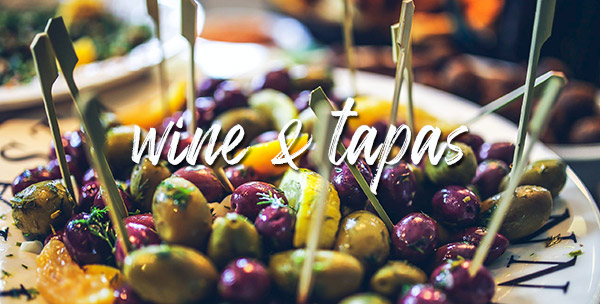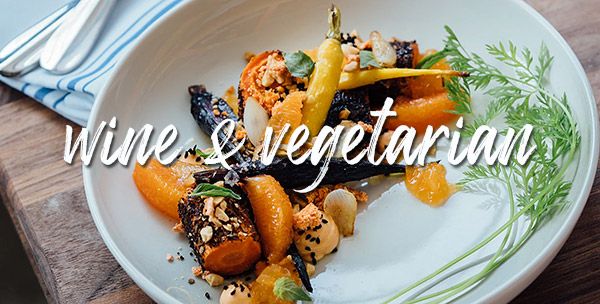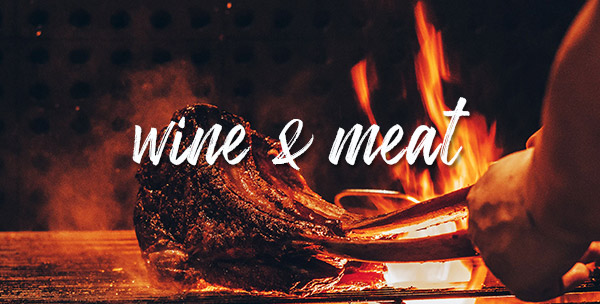When looking to pair a wine with seafood cuisine...
Try to focus on pairing the strength of flavours, weight and intensity of the dish in question with the wine. Wine and food are meant for each other; each enhances and strengthens the experience of the whole, they bring out the best in each other.
Consider whether a dish is ‘light’ , 'medium' or 'heavy' in nature - in general, look to pair a crisp, lighter-style wine with a light dish, a medium-style wine to pair with a slightly fuller dish, and a full-bodied wine to go with and complement a richer, heavier more intensely flavoured dish - and so forth...
Factors to take into account - are you starting with shellfish or seafood cooked simply and served on their own or with a salad with a lemon dressing. They work well with wines that share a natural undertone of acidity (e.g. Sauvignon Blanc, Riesling or Pinot Grigio). Think about the key flavours in a dish the same way you think about the flavours in wine - as families of flavours.
If a dish has more character, it has been lifted by seasoning, or has it been grilled or smoked, it will pair well with lightly oaked white wines. Does it have a firm texture or spices, then it can pair with different fuller styles of white wines or a Rosé. Then consider which wines offer complementary flavours, citrus or herbal notes etc. Take notice of a foods texture that is similar to that of the wine - and wines whose intensity of flavour match - enjoy the journey.

Fish & Chips:
You are looking to complement the subtle fish flavours, but also match the fat in the batter, plus the oil in the chips and flavours in the pea puree.
So you need a bright, crisp wine, with good fruit notes, light in weight and good acidity to release the subtle flavours in both.
• White Wine: A young, bright Sauvignon Blanc, Vouvray, an Un-oaked Chardonnay, plus a dry (Brut style) Sparkling wine.
• Red Wine: Difficult to match as most red wines will over power the subtle fish notes, though a Rosé wine pair on occasions.

Sardines:
You are looking to complement the medium to fuller, oily sardine flavours and characters, but also match the texture of the fish and the grilled cooking, herbs used and any citrus dressing.
So you need a lively, dry white wine with crisp fruit notes, a light palate weight and crisp acidity.
• White Wine: A crisp Pinot Grigio, Vinho Verde, a lively dry Riesling, a young Fumé Blanc also even a Brut/ Extra Brut Prosecco.
• Red Wine: Difficult to match as most red wines will over power the subtle fish notes, though a still or sparkling Rosé wine pair on occasions.

Salmon Gravlax:
You are looking to complement the richer, sweet, cured flavours in the Salmon Gravlax. But also match the oils, salt notes and texture of the fish and the techniques used to cure the salmon.
So you need a confident, dry wine with ripe fruits, bright, clean acidity to release the flavours in the fish oils and fats.
• White Wine: A quality Pouilly-Fumé, a lightly oak aged style Sauvignon Blanc, Pinot Grigio and a well balanced Rosé.
• Red Wine: A light style Pinot Noir or Beaujolais can pair with the Salmon flavours and if slightly chilled can bring out some sweeter notes.

Seared Scallops:
You are looking to complement the light, sweet flavours in the fresh scallops. But you are also looking to match the delicate oils and semi-firm texture and the grilled cooking techniques.
So you need a lively, bright, crisp white wine to release the subtle oils and flavours in found in the simple seared & served scallops.
• White Wine: A young, bright classic style Sauvignon Blanc, plus a dry Riesling, Pinot Grigio, Soave, Chenin Blanc and a Rosé.
• Red Wine: Can be difficult to pair as most red wines will over power/ even clash with the subtle flavours / notes in the soft shellfish.

Steamed Mussels:
You are looking to complement the richer flavours in the Mussels, but also match the firm/ chewy texture of the flesh and the steaming I the herbs and seasoning.
So you need a youthful, lively dry white wine with ripe fruits, clean, crisp acidity to release the flavours in the flesh of the Mussels.
• White Wine: A bright, dry style Sauvignon Blanc, a quality Vouvray (Chenin Blanc), a vibrant Riesling and even a dry Rosé.
• Red Wine: Can be difficult to pair as most red wines will over power and even clash the subtle/ shellfish, salty notes in the mussels.

Grilled Prawns:
You are looking to complement the subtle oils in the grilled prawns, but also match the semi-firm texture of the sweet flesh of the fresh prawns and the cooking techniques and any seasoning, dressing or sauce.
So you need a youthful, lively white wine with ripe pip-fruits and a core of balanced citrus acidity.
• White Wine: A full flavoured, vibrant Sauvignon Blanc, citrus focused Riesling, Soave, Orvieto and also a classic Grillo, dry Sherry & Prosecco.
• Red Wine: Can be difficult to pair as most red wines will over power the subtle notes, though a classic dry Rosé can/ will pair well.

Sushi / Sashimi:
You are looking to complement the subtle oils in the salmon or prawn sushi, but also match the texture of the flesh of the salmon, prawns and the sticky rice and avocado plus other seasoning.
So you need a youthful, lively wine with ripe fruits, clean acidity to release the flavours in the light ingredients used in the rolled sushi.
• White Wine: A lively, dry Rosé, a citrus focused Riesling, Albariño, an off-dry Pinot Gris, Pinot Grigio and a ripe Sauvignon Blanc.
• Red Wine: Can be difficult to pair - but on some occasions a chilled Gamay or a light style Pinot Noir can complement.

Paella:
You are looking to complement the infused oils and fresh spices in the Paella, but also pair with the different textures of the shellfish used along with the rice and slow cooking technique.
So you need a youthful, lively white wine with ripe fruits, bright acidity to release the flavours in the ingredients.
• White Wine: An Albariño, a full flavoured dry Riesling, a Fumé Blanc, Pinot Gris, an un-oaked Chardonnay and a quality Rosé.
• Red Wine: Can be difficult to match - but a light style Tempranillo (Rioja, Crianza) or a slightly chilled lighter style Pinot Noir.

Smoked Salmon:
You are looking to complement the subtle to rich infused oils in the smoked salmon, but also match the texture of the Salmon fillets and any oils and herbs coating the cured fish.
So you need a youthful, lively wine with ripe fruit characters and cleansing acidity to release the flavours in the dish.
• White Wine: A Pouilly-Fumé, oak style Sauvignon Blanc, a lightly oaked Chardonnay, dry Pinot Gris, Grüner Veltliner and a generous Rosé.
• Red Wine: Can be difficult to match - but a slightly chilled Gamay *(Beaujolais), Valpolicella or a lighter style Pinot Noir.

Steamed Fish:
You are looking to complement the subtle fish notes, but also match the light oils and texture of the steamed fish and the flavours in the rocket salad.
So you need a lively, light wine with crisp fruit flavours, with light palate weight and clean acidity to match the fish.
• White Wine: A lively Soave, a crisp Sauvignon Blanc, an Albariño, Verdicchio and a cool climate, classic dry Riesling.
• Red Wine: Difficult to match as most red wines will over power the subtle fish notes, though a Rosé wine pair on occasions.

River Trout:
You are looking to complement the richer, fuller flavours in the Trout, but also match the natural oil-rich texture of the fish and the cooking / baking techniques, the herbs and dressing.
So you need a confident, dry white wine with ripe fruit characters, a layered palate and bright, clean acidity.
• White Wine: A Sancerre, Pouilly-Fumé, an oak aged Sauvignon Blanc, a quality Grüner Veltliner and a Premier Cru Chablis.
• Red Wine: Difficult to match as most red wines will over power the fish, though a very light style Pinot Noir slightly chilled can pair on occasion.

Seared Tuna:
You are looking to complement the fuller, meaty flavours in the Tuna, but also match the oils and firm texture of the Tuna’s flesh and the cooking techniques used (i.e. seared, grilled, and seasoned).
So you need a confident, full wine with ripe sweet fruits, clean acidity to release the flavours in the firmer texture of the flesh.
• White Wine: A lightly oaked Chardonnay, Viognier / Chardonnay blend, Grüner Veltliner or a dry, quality Rosé.
• Red Wine: A youthful, fruit forward, medium weight Pinot Noir or quality Beaujolais will not over power the Tuna characters.

Calamari:
You are looking to complement the subtle oils in the Calamari, but also match the firmer texture of the flesh of the Squid and the cooking techniques. i.e. rings, tubes, cross-cut and seasoning.
So you need a youthful, lively white wine with ripe fruits, clean acidity to release the flavours in the firm flesh - (note: un-battered squid / calamari pairings)
• White Wine: A ripe, lively Sauvignon Blanc, Pinot Grigio, an off-dry Pinot Gris, Grüner Veltliner and dry Riesling, even a dry Rosé.
• Red Wine: Can be difficult to pair as most red wines will over power the subtle notes in the simple cooked/ served calamari.

Oysters:
You are looking to complement the subtle salty-oils in the oysters, but also match the silky texture of the flesh of the oysters and the raw nature.
So you need a youthful, lively, crisp white wine with ripe citrus focused fruits, with clean, crisp acidity to release the flavours in flesh.
• White Wine: A quality Chablis, a crisp, lively brut style Champagne, Vernaccia and a crisp dry Vouvray, even a Pinot Grigio.
• Red Wine:Can be difficult to pair as most red wines will over power and even clash the subtle / shellfish, salty notes typical with oysters.

Crayfish / Lobster:
You are looking to complement the subtle oils in the Crayfish, but also match the firmer texture of the sweet flesh of the crayfish/ lobster and the simple cooking techniques.
So you need a bright, lively white wine with ripe fruits, medium bodied and with clean acidity.
• White Wine: A full flavoured Chablis, a dry Rosé, lightly oaked Chardonnay, and a quality 'Blanc de Blancs' Champagne.
• Red Wine: Can be difficult to pair as most red wines will over power the subtle notes found in the firm textured flesh of the crayfish/ lobster.

Seafood Dumplings:
You are looking to complement the stronger flavours in the seafood dumplings, but also match the layered, mixed texture of the dumplings and the cooking techniques and any herbs and binding mixture.
So you need a full flavoured, lively white wine with rip fruits and acidity to match the flavours and seasoning in the dumpling mixture.
• White Wine: A ripe medium to full-bodied Pinot Gris, a sweet Riesling, Viognier, a light style Gewürztraminer and a good quality Rosé.
• Red Wine: Can be difficult to pair - but a soft style Gamay or a light style Pinot Noir, or Crianza can complement if lightly chilled.

Chilli Prawns:
You are looking to complement the chili spices and the oils both in the cooking and within the prawns, but also match the firmer, slightly chewy texture of the prawns and the cooking techniques.
So you need a full, lively white wine with ripe fruits, soft acidity to release the flavours and match the spices and seasoning.
• White Wine: A ripe Gewürztraminer, a full flavoured Pinot Gris, a ripe style Riesling, a semi-sweet Rosé, Amontillado Sherry and a 'dry' Prosecco.
• Red Wine: Can be difficult to pair - but a slightly chilled Gamay or a light style Pinot Noir can complement.

Seafood Pie:
You are looking to complement the richer, creamy flavours in the baked pie, but also matching the texture of the seafood pieces and vegetables, plus the pastry case and crust.
So you need a full, lively white wine with ripe fruits, good body and a dry, clean acidity to release the flavours in the fish pie.
• White Wine: A smoky oak-aged or (barrel fermented) style Sauvignon Blanc, and a classic 'barrel fermented' full-bodied richer style Chardonnay.
• Red Wine: Can be difficult to pair - but a dry, medium to full-bodied style Beaujolais or light Pinot Noir can complement.



